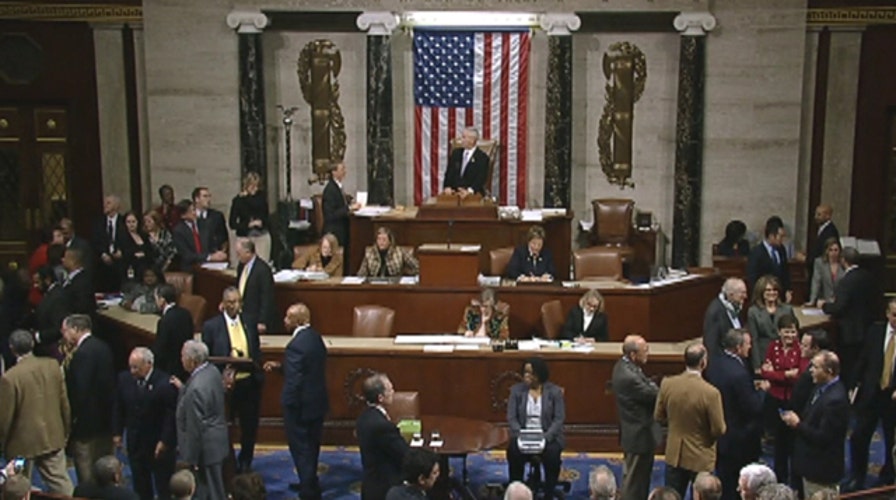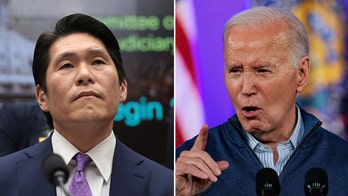Crisis averted? Well, not quite.
Despite Congress approving a hard-fought bill late Tuesday night that halts tax hikes for millions of Americans, lawmakers have only set themselves up for another risky battle weeks from now.
The deal, which President Obama plans to sign, was notable for how much unfinished business is left on the table. The bill pushed off for two months a decision on automatic spending cuts originally set to hit Tuesday. And left unaddressed was the debt ceiling, which the country would have hit Dec. 31 if not for emergency measures taken by the Treasury Department.
Lawmakers could be forced to reckon with both those issues around the same time, setting up another protracted and bitter showdown that will likely include pitched battles over entitlements and taxes.
Obama, before leaving for Hawaii to rejoin his family vacation, warned Tuesday night that he would not permit another debt-ceiling battle like the one in the summer of 2011.
"While I will negotiate over many things, I will not have another debate with this Congress over whether or not they should pay the bills that they've already racked up through the laws that they passed," Obama said. "Let me repeat. We can't not pay bills that we've already incurred. If Congress refuses to give the United States government the ability to pay these bills on time, the consequences for the entire global economy would be catastrophic, far worse than the impact of a fiscal cliff."
But the president may not have a choice. Republicans' appetite for spending cuts only grew on the heels of the fiscal crisis bill, which contained only a nominal amount of net spending cuts. In the House, 151 Republicans opposed the final bill -- compared with 85 who supported it.
"We've got to get real about this -- we're heading down the road to Europe," Sen. Richard Shelby, R-Ala., who opposed the bill on the Senate side, told Fox News on Wednesday.
Sen. Bob Corker, R-Tenn., was calling for a renewed debt-ceiling battle even before the House voted Tuesday night.
"Now that we've addressed the revenue part of the equation, it's time to move on to the spending reductions that will be part of the debt ceiling package," he said. "Passing fundamental entitlement reform is the most important action we can take in ensuring our country's solvency and now we must have the courage to finish the job and make the tough choices necessary to get these problems behind us once and for all."
All sides have stressed the need to tackle entitlement and tax reform this year. Obama and House Speaker John Boehner both pledged to do so after the fiscal crisis bill passed. But while Obama wants that debate to play out independently, many Republicans see the debt-ceiling issue as their best leverage for extracting serious spending cuts and reform.
Still, the last big effort to reduce the deficit landed Congress in a quagmire they still haven't been able to extract themselves from. Sweeping spending cuts, half of which would hit the Pentagon, are still on schedule to hit this year -- an outcome triggered by the 2011 debt-ceiling deal. Prior efforts to avert those cuts have failed, and the fiscal crisis bill merely delayed them by two months. While Congress deals with the debt ceiling, lawmakers also will be scrambling by that deadline to craft a new deficit-reduction bill that overhauls those cuts.
Noting the fights ahead, Rep. Steve LaTourette, R-Ohio, said in a statement that "no one in Washington should take a victory lap."
"This short-term deal was a necessary one, but it has simply kicked the can down the road when it comes to dealing with the national debt," he said.
The bill passed by Congress Tuesday night would nix a wave of 2013 tax increases for families making less than $450,000, while letting rates rise for those making above that threshold. It would also extend unemployment insurance for another year, while patching up a host of other expiring provisions and delaying automatic spending cuts for two months. Those cuts, which would hit defense heavily, will instead be offset with a blend of tax increases and other spending cuts.
Americans will still see a 2-point increase this month in their Social Security tax, as Congress did not opt to extend that payroll tax holiday.
The 257-167 vote in the House came after a day of high drama on Capitol Hill, during which conservative House lawmakers voiced serious concern about the Senate bill's lack of spending cuts. Rank-and-file Republicans initially predicted they would tinker with the package, raising the possibility the Senate would abandon it and nothing would get done before the new congressional class is seated Thursday.
But House leaders soon learned they did not have a majority behind any spending-cut plan, and allowed the straight vote. Far more Democrats supported the final bill than Republicans.





